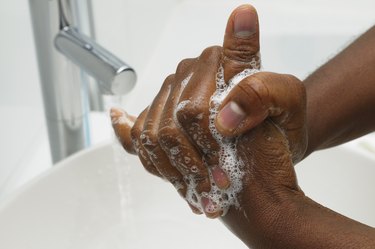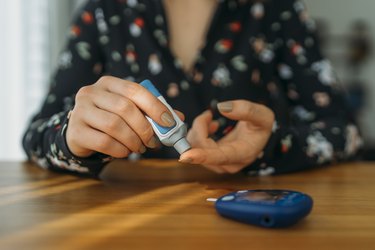
You've probably heard that chronic medical conditions can increase your risk of complications, and even death, from COVID-19. But what does that really mean for someone who has one of these conditions?
We talked to the experts to find out why pre-existing conditions up your risk and what exactly you can do to stay safe and healthy.
Video of the Day
Video of the Day
Get tips on how to stay healthy, safe and sane during the novel coronavirus pandemic.
What the Studies Say
The three most common underlying health problems associated with more serious complications from COVID-19 were cardiovascular disease, diabetes and chronic lung disease, per a June 2020 report from the Centers for Disease Control and Prevention (CDC). Hospitalizations were six times higher and the risk of death was 12 times higher in people who had these conditions.
Other research has shown a similar relationship. Forty percent of deaths from COVID-19 are related to complications of the cardiovascular system, according to a May 2020 study in Circulation Research. And, diabetes is associated with a two- to threefold increase in adverse outcomes, per a June 2020 study in the Journal of Diabetes Investigation.
The data points to a link between these health conditions and more severe outcomes related to COVID-19.
"A lot of these risk factors and disorders cluster together," says Duane Pinto, MD, MPH, a cardiologist at Beth Israel Deaconess Medical Center. "We don't really know if it's one of those things or all of those things together that's conspiring and leading to the bad outcomes."
"Pre-existing conditions don't raise your chances of catching the virus."
But researchers are starting to tease apart some of the differences.
Panagis Galiatsatos, MD, an assistant professor at Johns Hopkins School of Medicine, recently completed a meta-analysis of 119 previously published reports to examine the relationships between pre-existing conditions and COVID-19 outcomes. The study hasn't been published yet, but it found that pre-existing conditions are an independent risk factor for worse outcomes for COVID-19. "It's not because patients are older. Age is an independent variable and so is having diabetes," Dr. Galiatsatos tells LIVESTRONG.com.
Why Pre-Existing Conditions Increase Your Risk for Complications From COVID-19
It's not all that surprising that a healthy person would fare better than someone with heart disease or diabetes. Still, doctors aren't exactly sure why that appears to be the case — although there seem to be three main factors at play.
1. Pre-Existing Conditions Affect Your Immune System
Underlying health conditions have always been risk factors for infections and worse symptoms. "This isn't new to COVID-19," Dr. Galiatsatos says.
For example, diabetes is a condition that affects multiple organs and systems in your body, including your immune system, which may contribute to more severe COVID-19 symptoms. Poor blood sugar control, a common symptom of those diagnosed with diabetes, negatively affects the way your immune system functions, increases inflammation and makes it harder for your body to clear viruses from your system, too, per the June 2020 Journal of Diabetes Investigation study.
2. Your Body Is Fighting on Multiple Fronts
If you have a pre-existing condition, you might have less reserve to deal with what can be quite a severe illness, Dr. Pinto says. With no pre-existing conditions, you would fight COVID-19 on one front. "But if you have heart disease, kidney disease, a pre-existing lung condition, then you're fighting on three or four fronts at the same time," Dr. Pinto says.
"Many of the complications associated with COVID-19 are related to the blood vessels," especially high blood pressure, says Peter Libby, MD, a cardiovascular medicine specialist at Brigham and Women's Hospital and the Mallinckrodt Professor of Medicine at Harvard Medical School. High blood pressure is associated with a greater likelihood of hardening of the arteries.
If you have normal arteries that supply oxygen and nutrients to the heart, your heart can handle it just fine, Dr. Libby says. But if you have an underlying health condition like high blood pressure, your heart needs to pump harder to increase output and to send blood to the hungry tissues, he says. In other words, your cardiovascular system may not be robust enough to react to the infection.
And damage to the lining of the blood vessels can also lead to an overactive immune system response, known as a cytokine storm, and problems with the body's clotting mechanism, making you more prone to blood clots.
3. Potential Socioeconomic Factors
Lastly, patients with pre-existing conditions may, generally, be a little sicker overall due to disparate access to health care and other socioeconomic factors. "Not having good access to medical care, socioeconomic status, diabetes and premature heart disease all kind of cluster together," Dr. Pinto says. "They might not have had the ability to take of themselves. Those are the people who might be overrepresented in the ICU."
Related Reading
Staying Healthy and Safe
If you have a pre-existing condition, the best way to fight the virus that leads to COVID-19 is to avoiding catching it in the first place. "Pre-existing conditions don't raise your chances of catching the virus," Dr. Galiatsatos says. "Your susceptibility depends on how well you re-engineer your lifestyle."
Follow Best Practices to Avoid Getting Infected
Without a vaccine or anti-viral treatment, strategies that minimize your chances of becoming infected are even more important if you have a pre-existing condition — wash your hands, maintain social distance and wear a mask.
No need for a medical-grade mask. "Cloth masks or coverings can go a long way to protecting people you might come in contact with," Dr. Libby says.
Consider Your Destination
Limit how much you are around others, and avoid going places where it won't be possible to socially distance from others, per the CDC.
"If you're going to a place where face masks are optional, do not go. Face masks are highly effective for an individual only if everyone around them is also wearing a face mask," Dr. Galiatsatos says. "To stay safe, it's going to take changes to your own behavior and a strong reliance on others to do the right thing."
Manage Your Condition

Don't forget to keep up treatment for your condition. For individuals with diabetes, continue to monitor blood sugar levels and keep up with your treatment plan. For those with high blood pressure, don't skip your medication.
Weigh Your Risk
Considering your daily activities and what precautions to take is a difficult calculus, especially in places where there aren't many COVID-19 infections. The risk of infection can feel more theoretical when compared to the concrete need to pay the bills and care for your family. Keep in mind the following factors:
The Severity of Your Illness
Consider your decision of what to do and not do, Dr. Pinto says, in context of your personal situation — what is your personal risk, what are your chances of contracting the virus and if you were to become infected, what would happen?
"People with these pre-existing conditions should self-select for the severity of their illnesses," Dr. Pinto says. For example, if you've been managing heart disease for 20 years and had a prior heart attack, you need to be more vigilant compared to someone who has been treated and cured of a heart disorder.
Your doctor can help you assess the risk of different activities.
The Conditions in Your Local Community
Consider what's happening in your community, too. If possible, delay errands, appointments and other obligations until infections are on the decline, Dr. Pinto suggests. If infections are surging in your community, resume activities only "under duress, if there's an emergency because the consequences for you can be so dire," he says.
Assimilating back into public life also means expanding your social circle.
Talk to people before you engage with them, Dr. Galiatsatos recommends. "This is really tough, but if you want to hang out with a friend and know that he or she hasn't abided by the guidelines, you might want to stick with Zoom or FaceTime," he says.
The same goes for returning to work. Talk to your employer about what precautions will be put into place. If you do head back to work, sanitize your work space and regularly wash your hands.
There's no one-size-fits-all answer. Talk to your doctor about what precautions make sense for you, your lifestyle and your needs.
Concerned About COVID-19?
Read more stories to help you navigate the novel coronavirus pandemic:
- Centers for Disease Control and Prevention: “Coronavirus Disease 2019 Case Surveillance—United States, January 22-May 30, 2020”
- Circulation Research: “COVID-19 and the Heart”
- Journal of Diabetes Investigation: “Dissecting the Interaction between Coronavirus Disease 2019 and Diabetes Mellitus”
- Centers for Disease Control and Prevention: "People of Any Age with Underlying Medical Conditions"
Was this article helpful?
150 Characters Max
0/150
Thank you for sharing!
Thank you for your feedback!
Is this an emergency? If you are experiencing serious medical symptoms, please see the National Library of Medicine’s list of signs you need emergency medical attention or call 911.